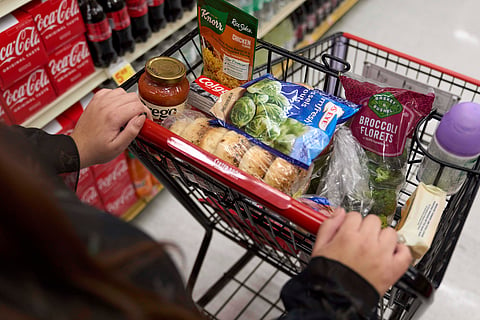UAE residents buy fewer groceries, turn to budget stores: Is inflation to blame?
UAE shoppers rethink spending as prices ease but value and trust drive grocery choices

Dubai: UAE households are changing how they shop — buying fewer grocery items, switching to budget stores, and delaying non-essential purchases.
Even though food inflation in the UAE has eased sharply — from 3.7% in early 2024 to just 0.36% by 2025, according to the Central Bank of the UAE — the feeling that prices are still high hasn’t gone away.
The concern isn’t just about what’s on the receipt. It’s about perception, budgeting, and value — and it’s reshaping where and how people spend.
A new Blue Yonder 2025 Global Consumer Sentiment on Grocery Inflation Survey, which polled more than 6,000 shoppers worldwide (including in the Middle East), found that 85% remain worried about grocery inflation. That anxiety is now visible across UAE supermarket aisles.
Spend less, shop smarter
The survey found that 65% of consumers are buying fewer grocery items overall, while 42% are turning to discount or wholesale stores. Another 36% chase promotions, and 34% switch to private-label brands to save money.
This pattern mirrors what’s happening in the UAE, where residents are becoming more deliberate with purchases. Families are buying in smaller quantities, watching for weekend deals, and favouring retailers that offer clear pricing and regular discounts.
Retailers across Dubai and Abu Dhabi say foot traffic now spikes when price promotions hit. “Customers are far more selective,” said one Dubai supermarket operator. “They wait for the right deal before filling their trolleys.”
Import costs still drive prices
The UAE’s reliance on imports — around 80% of its agricultural products come from abroad, according to a US Department of Agriculture (USDA) report citing Euromonitor data — leaves grocery prices exposed to global shipping costs, tariff changes, and currency swings.
The Blue Yonder survey found that 49% of consumers blame tariffs for higher grocery costs, 42% point to rising raw material prices, and 39% to higher labour expenses in manufacturing and processing.
In the Middle East, tariffs are viewed as the main culprit, compared with Europe where raw materials lead the blame. That perception shapes how shoppers respond and how much they trust retailers’ pricing.
Shoppers cut back elsewhere
To keep grocery budgets steady, households are spending less in other areas. The Blue Yonder survey shows 56% have reduced spending on clothing and footwear, 46% on electronics, and 43% on streaming subscriptions.
Retail analysts say this reallocation of spending reflects a “new budgeting reality” — one where people are prioritising essential goods and treating discretionary items as optional. Even as inflation stabilises, consumer behaviour remains cautious.
Value, loyalty go hand in hand
Retailers that consistently offer fair prices, dependable stock, and transparent promotions are earning stronger customer loyalty. Shoppers are rewarding brands that make budgeting easier — and punishing those that don’t.
Digital loyalty programmes are also becoming central to how people shop. Nearly eight in ten UAE consumers (79%) say they’re more likely to shop often and stay longer if offered personalised promotions or discounts.
Online grocery shopping is expanding fast — valued at $3.4 billion in 2024 and projected to grow fivefold by 2033. Many shoppers now split their purchases between stores and apps, tracking deals across both.
What it means for UAE retailers
For UAE grocers, the message is clear: price stability and trust are now non-negotiable. Retailers are responding by tightening supply chains, growing private-label ranges, and using AI-driven forecasting tools — such as those developed by Blue Yonder — to predict demand, cut waste, and keep essential goods available.
Inflation may no longer dominate headlines, but its effects are still shaping daily decisions. For UAE consumers, every dirham counts — and for retailers, every choice a shopper makes is a reminder that value now matters more than ever.
Sign up for the Daily Briefing
Get the latest news and updates straight to your inbox



